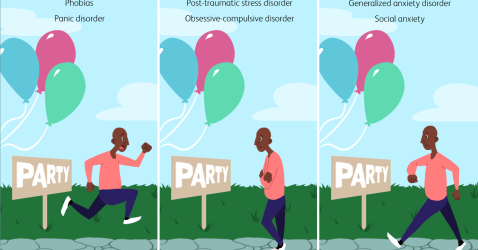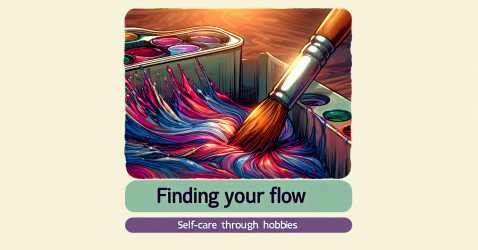Boosting Resilience By 40%: The Impact Of Daily Self-Care Habits
Imagine being able to increase your resilience by a whopping 40% just by incorporating some simple self-care habits into your daily routine. It may sound too good to be true, but recent research has shown that taking care of yourself can have a profound impact on your ability to bounce back from life’s challenges. In this article, we will explore the fascinating findings on the power of daily self-care habits and how they can transform your life. Get ready to discover the secret to boosting your resilience and thriving in the face of adversity.
The Importance of Resilience
Resilience is a significant trait that plays a vital role in our lives. It refers to the ability to bounce back from adversity, challenges, and setbacks. Being resilient allows you to adapt to change, recover from difficult situations, and maintain a positive outlook.
Understanding Resilience
Resilience is not an innate quality; rather, it is a skill that can be learned and developed. It involves having a growth mindset and the ability to persevere in the face of obstacles. Resilient individuals are able to manage stress effectively and maintain their emotional well-being. They possess the mental toughness to learn from failures and setbacks, and use them as opportunities for personal growth and development.
Benefits of Resilience in Daily Life
Resilience has numerous benefits that extend beyond the ability to overcome challenges. It helps you maintain a balanced and fulfilling life, even in the midst of difficult circumstances. Resilient individuals tend to have better mental health, as they are better equipped to cope with stress and manage emotions. They also have stronger relationships and social connections, as they are able to empathize with others and provide support. Resilient people are more likely to achieve their goals, as they have the tenacity and determination to persist even when faced with setbacks. Ultimately, resilience allows you to lead a more joyful and meaningful life.
Resilience vs. Mental Health
Although resilience and mental health are closely related, they are not the same thing. Mental health refers to the overall emotional and psychological well-being of an individual, while resilience is a specific trait that contributes to mental health. Resilience helps individuals cope with challenges and maintain their mental health, but it does not guarantee mental health or prevent mental illness. However, nurturing resilience through self-care practices can significantly enhance mental health and well-being.
Defining Self-Care
Self-care is an intentional practice of taking care of oneself in various aspects of life. It involves prioritizing your physical, emotional, and mental well-being in order to maintain balance and prevent burnout. Self-care is not selfish; it is a necessary practice that allows you to show up fully in your life and be there for others.
Exploring the Concept of Self-Care
Self-care goes beyond simply pampering oneself. It involves engaging in activities and practices that promote overall well-being and enhance resilience. Self-care activities can be as simple as taking time for relaxation, engaging in hobbies, or nurturing social connections. It is about understanding and meeting your needs, and finding ways to recharge and rejuvenate yourself.
Different Types of Self-Care
Self-care can be categorized into different types, each addressing a specific aspect of well-being. Physical self-care focuses on taking care of your body through exercise, nutrition, and restful sleep. Emotional self-care involves recognizing and managing your emotions, and seeking support when needed. Mental self-care includes activities that stimulate your mind and promote mental well-being, such as practicing mindfulness or engaging in hobbies. Lastly, social self-care centers around nurturing and maintaining healthy relationships and connections with others.
Self-Care Misconceptions
There are some misconceptions surrounding self-care that need to be dispelled. Many believe that self-care is a luxury or an indulgence reserved for those with ample time and resources. However, self-care is essential for everyone, regardless of their circumstances. It does not need to be elaborate or time-consuming; even small acts of self-care can have a profound impact on your overall well-being. Additionally, self-care is not synonymous with selfishness. Taking care of yourself is a necessary foundation for being able to care for others effectively.
The Link Between Self-Care and Resilience
Self-care and resilience are interconnected, with self-care playing a crucial role in strengthening resilience. By prioritizing self-care, you enhance your ability to bounce back from challenges and setbacks, and maintain your overall well-being.
How Self-Care Enhances Resilience
Self-care acts as a preventive measure against burnout and stress, allowing you to build resilience. By taking care of your physical, emotional, and mental well-being, you are better equipped to handle stress and adversity. Engaging in self-care practices nurtures your overall well-being, enhances your ability to adapt to change, and promotes a positive mindset. It helps you develop the inner resources necessary to face challenges with more confidence and optimism.
Factors That Influence the Impact of Self-Care on Resilience
The impact of self-care on resilience can vary depending on various factors. Firstly, the consistency and regularity of self-care practices play a significant role. Engaging in self-care sporadically may provide temporary relief, but incorporating it into your daily routine is key to reaping long-term benefits. Secondly, the quality of self-care practices matters. It is important to choose activities that truly nourish and rejuvenate you, rather than engaging in empty distractions. Lastly, individual differences and personal needs should be taken into consideration. Each person has different preferences and requirements when it comes to self-care, so it is essential to customize your practices to suit your own needs.
Identifying Daily Self-Care Habits
Cultivating a daily self-care routine is essential for building resilience and maintaining well-being. By incorporating self-care habits into your daily life, you create a solid foundation for resilience and enhance your overall quality of life.
Self-Care Checklist: Assessing Personal Habits
To identify your daily self-care habits, it is helpful to evaluate your current routine and assess whether it promotes well-being and resilience. Consider various aspects of self-care, such as your physical health, emotional well-being, mental stimulation, and social connections. Take note of activities that currently contribute positively to these areas and identify any areas that may require more attention.
Popular Daily Self-Care Habits to Boost Resilience
There are numerous self-care habits that can be incorporated into your daily routine to boost resilience. Some popular ones include engaging in regular exercise, practicing mindfulness or meditation, getting sufficient sleep, setting boundaries and saying no when necessary, engaging in hobbies or creative outlets, and nurturing social connections. These practices help you recharge, manage stress, and maintain a positive outlook.
Customizing Self-Care Habits to Individual Needs
It is important to customize your self-care habits according to your individual needs and preferences. What works for one person may not work for another. Pay attention to activities that bring you joy, relaxation, and fulfillment, and incorporate them into your routine. Consider experimenting with different self-care practices to find what resonates with you and provides the greatest benefits.
Building Psychological Resilience through Self-Care
Psychological resilience refers to the ability to adapt and recover from adversity, particularly in the realm of emotional and mental well-being. By incorporating self-care practices into your life, you can effectively build and enhance psychological resilience.
Enhancing Emotional Well-being
Self-care practices can significantly contribute to your emotional well-being. Engaging in activities that allow you to express and process your emotions, such as journaling or talking to a trusted friend or therapist, can help you navigate difficult emotions and build emotional resilience. Taking time for relaxation and self-reflection can also promote emotional well-being and equip you to handle challenges more effectively.
Cultivating Positive Thinking and Mindfulness
Practicing positive thinking and mindfulness is another way to build psychological resilience. By training your mind to focus on the present moment and shift toward positive perspectives, you can develop a resilient mindset. Self-care practices that promote mindfulness, such as meditation or deep breathing exercises, can help reframe negative thoughts and reduce stress.
Managing Stress Levels through Self-Care
Stress management is a crucial aspect of building psychological resilience. Engaging in self-care practices that reduce stress, such as exercise, spending time in nature, or engaging in relaxation techniques, can help regulate your stress levels and equip you to handle challenges more effectively. Prioritizing rest and relaxation is also important for replenishing your energy and maintaining overall well-being.
The Physical Aspect of Self-Care
Physical self-care is an integral part of overall well-being and resilience. Taking care of your body through exercise, nutrition, and restful sleep can significantly impact your ability to bounce back from challenges and maintain a positive outlook.
The Connection Between Physical Health and Resilience
Physical health plays a crucial role in building resilience. When your body is healthy and well-cared for, you have more energy and stamina to face challenges. Prioritizing physical self-care enhances your ability to adapt to change, manage stress, and maintain overall well-being.
Implementing Exercise and Fitness Routines
Regular exercise is a powerful self-care practice that boosts resilience. Engaging in physical activity not only improves your physical health but also releases endorphins, which are natural mood boosters. Whether it’s going for a walk, practicing yoga, or participating in a team sport, finding a form of exercise that you enjoy is essential for building physical resilience.
Optimizing Nutrition and Sleep for Resilience
Nutrition and sleep are vital components of physical self-care. Eating a balanced diet that includes a variety of nutrient-rich foods provides your body with the fuel and nutrients it needs to function optimally. Prioritizing restful sleep is also crucial, as it allows your body to recharge and recover. By optimizing your nutrition and sleep, you enhance your physical well-being and equip yourself to face challenges with more energy and vitality.
Nurturing Social Connections
Social connections and relationships play a significant role in building resilience. Nurturing and maintaining healthy social connections is a vital aspect of self-care.
The Role of Social Support in Building Resilience
Social support provides a strong foundation for resilience. Having a network of supportive friends, family, and loved ones can greatly enhance your ability to cope with challenges. Social connections serve as a source of emotional support, encouragement, and perspective, helping you navigate difficult times with a sense of belonging and community.
Prioritizing Relationships and Communication
Self-care includes prioritizing your relationships and investing time and effort in meaningful connections. Take the time to nurture your relationships, engage in open and honest communication, and offer support to those around you. Prioritize spending quality time with loved ones and participating in activities that foster connection and belonging.
Engaging in Meaningful Connections for Improved Resilience
In addition to existing relationships, actively seeking out meaningful connections can further enhance resilience. Engage in activities or join groups that align with your interests and values, providing opportunities to meet like-minded individuals and cultivate new relationships. Building a supportive network not only boosts your resilience but also contributes to your overall well-being.
Creativity and Self-Care
Creativity can be a powerful tool for self-care and resilience. Engaging in artistic activities and exploring creative outlets allows you to express yourself, reduce stress, and boost your overall well-being.
Exploring the Therapeutic Effects of Creativity
Creativity has been shown to have numerous therapeutic effects. Engaging in creative activities activates different parts of your brain, stimulates your imagination, and allows for self-expression. Whether it’s painting, writing, playing a musical instrument, or engaging in any other creative endeavor, the act of creating can promote relaxation, mindfulness, and a sense of fulfillment.
Incorporating Artistic Activities into Self-Care
Incorporating artistic activities into your self-care routine can provide a much-needed outlet for self-expression and stress relief. Set aside time to engage in activities that bring you joy and allow your creative spirit to thrive. Whether it’s journaling, knitting, photography, or dancing, find ways to incorporate creativity into your daily life as a means of self-care and resilience.
Boosting Resilience through Creative Outlets
Engaging in creative outlets not only nurtures your well-being but also boosts resilience. The act of creating fosters a sense of accomplishment and empowerment, reminding you of your strengths and abilities. It can also provide a fresh perspective and new solutions to challenges. By incorporating creative activities into your self-care routine, you can enhance your resilience and develop additional coping mechanisms.
Developing a Self-Care Routine
Developing a sustainable self-care routine is essential for reaping the benefits of self-care and building resilience. By creating a daily routine that includes self-care practices, you ensure that your well-being remains a priority.
Creating a Sustainable Daily Routine
When developing a self-care routine, consider your schedule and commitments, and allocate specific time slots for self-care activities. Start with small, manageable steps and gradually increase the time and variety of practices. Remember that self-care is an ongoing process and that routines may need to be adjusted based on changing circumstances.
Tips for Overcoming Obstacles and Excuses
Overcoming obstacles and excuses is crucial in maintaining a self-care routine. Many individuals often struggle with finding time, feeling guilty, or prioritizing the needs of others over their own. It is important to recognize that self-care is not selfish and that taking care of yourself allows you to be more present and effective in other areas of life. Set boundaries, communicate your needs, and advocate for yourself. Ensure that self-care becomes a non-negotiable part of your daily routine.
Tracking Progress and Evaluating Results
Keeping track of your self-care practices and evaluating the results can provide valuable insights into what works best for you. Track your self-care activities in a journal or an app and reflect on how they make you feel and contribute to your well-being. Regularly evaluate your routine and make adjustments as needed. Listen to your body and mind, and make self-care a continuous journey of growth and self-discovery.
Overcoming Challenges and Obstacles
Practicing daily self-care can sometimes be challenging due to various reasons. However, it is important to address these challenges and find ways to overcome them in order to maintain resilience and well-being.
Common Challenges in Practicing Daily Self-Care
Common challenges in practicing daily self-care include lack of time, competing priorities, feeling guilty or selfish, and low motivation. Recognize these challenges as valid but not insurmountable. It may require creativity, flexibility, and assertiveness to overcome these obstacles and make self-care a priority.
Addressing Time Constraints and Self-Care Guilt
Time constraints are a common barrier to consistent self-care. However, remember that self-care doesn’t have to be time-consuming or elaborate. Even small pockets of time can be utilized effectively for self-care. Similarly, feeling guilty about prioritizing self-care is counterproductive. Remind yourself that taking care of yourself is necessary for you to show up fully in other areas of life.
Seeking Support and Accountability
Seeking support and accountability from others can be helpful in maintaining a self-care routine. Share your self-care goals with trusted friends or family members, or consider joining a support group or online community centered around self-care. Having someone to check in with and hold you accountable can motivate and encourage you to prioritize self-care consistently.
In conclusion, self-care plays a crucial role in building resilience and maintaining overall well-being. By understanding the connection between self-care and resilience, identifying daily self-care habits, and developing a sustainable routine, you can significantly enhance your ability to bounce back from challenges, manage stress, and lead a more fulfilling life. Prioritizing self-care is not only essential for your own well-being but also enables you to show up as your best self for others. So, embrace the power of self-care, nurture your resilience, and embrace a more joyful and resilient life.

















